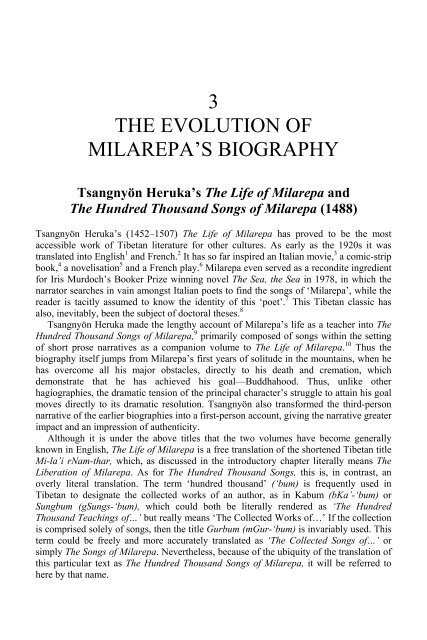The Biographies of Rechungpa: The Evolution of a Tibetan ...
The Biographies of Rechungpa: The Evolution of a Tibetan ...
The Biographies of Rechungpa: The Evolution of a Tibetan ...
You also want an ePaper? Increase the reach of your titles
YUMPU automatically turns print PDFs into web optimized ePapers that Google loves.
3<br />
THE EVOLUTION OF<br />
MILAREPA’S BIOGRAPHY<br />
Tsangnyön Heruka’s <strong>The</strong> Life <strong>of</strong> Milarepa and<br />
<strong>The</strong> Hundred Thousand Songs <strong>of</strong> Milarepa (1488)<br />
Tsangnyön Heruka’s (1452–1507) <strong>The</strong> Life <strong>of</strong> Milarepa has proved to be the most<br />
accessible work <strong>of</strong> <strong>Tibetan</strong> literature for other cultures. As early as the 1920s it was<br />
translated into English 1 and French. 2 It has so far inspired an Italian movie, 3 a comic-strip<br />
book, 4 a novelisation 5 and a French play. 6 Milarepa even served as a recondite ingredient<br />
for Iris Murdoch’s Booker Prize winning novel <strong>The</strong> Sea, the Sea in 1978, in which the<br />
narrator searches in vain amongst Italian poets to find the songs <strong>of</strong> ‘Milarepa’, while the<br />
reader is tacitly assumed to know the identity <strong>of</strong> this ‘poet’. 7 This <strong>Tibetan</strong> classic has<br />
also, inevitably, been the subject <strong>of</strong> doctoral theses. 8<br />
Tsangnyön Heruka made the lengthy account <strong>of</strong> Milarepa’s life as a teacher into <strong>The</strong><br />
Hundred Thousand Songs <strong>of</strong> Milarepa, 9 primarily composed <strong>of</strong> songs within the setting<br />
<strong>of</strong> short prose narratives as a companion volume to <strong>The</strong> Life <strong>of</strong> Milarepa. 10 Thus the<br />
biography itself jumps from Milarepa’s first years <strong>of</strong> solitude in the mountains, when he<br />
has overcome all his major obstacles, directly to his death and cremation, which<br />
demonstrate that he has achieved his goal—Buddhahood. Thus, unlike other<br />
hagiographies, the dramatic tension <strong>of</strong> the principal character’s struggle to attain his goal<br />
moves directly to its dramatic resolution. Tsangnyön also transformed the third-person<br />
narrative <strong>of</strong> the earlier biographies into a first-person account, giving the narrative greater<br />
impact and an impression <strong>of</strong> authenticity.<br />
Although it is under the above titles that the two volumes have become generally<br />
known in English, <strong>The</strong> Life <strong>of</strong> Milarepa is a free translation <strong>of</strong> the shortened <strong>Tibetan</strong> title<br />
Mi-la’i rNam-thar, which, as discussed in the introductory chapter literally means <strong>The</strong><br />
Liberation <strong>of</strong> Milarepa. As for <strong>The</strong> Hundred Thousand Songs, this is, in contrast, an<br />
overly literal translation. <strong>The</strong> term ‘hundred thousand’ (‘bum) is frequently used in<br />
<strong>Tibetan</strong> to designate the collected works <strong>of</strong> an author, as in Kabum (bKa’-‘bum) or<br />
Sungbum (gSungs-‘bum), which could both be literally rendered as ‘<strong>The</strong> Hundred<br />
Thousand Teachings <strong>of</strong>…’ but really means ‘<strong>The</strong> Collected Works <strong>of</strong>…’ If the collection<br />
is comprised solely <strong>of</strong> songs, then the title Gurbum (mGur-‘bum) is invariably used. This<br />
term could be freely and more accurately translated as ‘<strong>The</strong> Collected Songs <strong>of</strong>…’ or<br />
simply <strong>The</strong> Songs <strong>of</strong> Milarepa. Nevertheless, because <strong>of</strong> the ubiquity <strong>of</strong> the translation <strong>of</strong><br />
this particular text as <strong>The</strong> Hundred Thousand Songs <strong>of</strong> Milarepa, it will be referred to<br />
here by that name.











